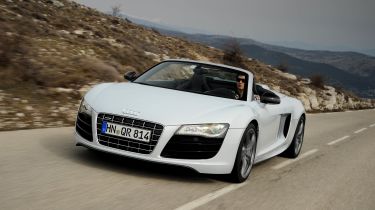Audi R8 Spyder R Tronic
We hit the road in the ultimate Audi – this time with an automatic gearbox

Taking the roof off the R8 has done nothing to dilute its appeal or ability – in fact the experience is enhanced in every way. Performance is just as searing as the coupe and there’s even more chance to hear that wonderful V10. While the R Tronic automatic does a good job, it has a few flaws and just can’t match the satisfaction of the manual version, which boasts a delicious open gate and a slick change. Plus it’s cheaper too.
THE R8 has blown its top – and in some style! Earlier this week, Auto Express got its hands on the six-speed manual version of Audi’s new flagship supercar. It scored top marks – so can the automatic R Tronic model do the same?
Because the firm’s twin-clutch S Tronic gearbox won’t fit in a mid-engined car, the R8 Spyder uses an automated manual transmission instead. Boasting a full automatic mode plus F1-style steering wheel paddles and a conventional lever – and even launch control – it still has plenty of enticing ingredients, though.
WATCH THE R8 SPYDER IN ACTION WITH ITS ROOF DOWN
And around town, it’s smooth, handling stop-start traffic and low-speed parking manouevres very well indeed. Head out onto the open road, floor the throttle and upchanges are pretty smooth too, but only if you take control yourself and remember to lift off the accelerator slightly – if you don’t, progress can be jerky.
Annoyingly, flooring the throttle can sometimes result in the transmission kicking down a gear too, when all you really want is for the V10 engine to call on its huge 530Nm torque reserves. On the downshift it’s great, though, blipping the throttle and provoking a glorious bark from the exhausts with every pull of the left-hand paddle.
However, the paddles themselves really should be larger – they can be fiddly to locate at high speed and allow just one steering wheel position for your hands – while instead of pushing forward on the lever on the transmission tunnel to change up, it would make more sense if you could pull it back.
Launch control is a fun feature, though. Put the ‘box in Sport mode, turn off the traction control, step on the brakes and the throttle and as soon as the engine settles to a constant speed you can release your left foot for a rocket-like start!
While the gearbox may not be quite perfect, the rest of the car very nearly is. Removing the roof has added some 100kg to the R8's kerbweight and there's a tiny amount of shake in the chassis (the interior mirror wobbles a little over bumps), but the best bit is that it means you can here every single note of the incredible 518bhp 5.2-litre V10.
Sounding just like a pair of bassy five-cylinder engines in unison, it makes the hairs stand up on our neck at its 8,000rpm peak. And despite the increased weight, performance is still incredible with 0-62mph in 4.1 seconds and a top speed – roof up – of 195mph.
It’s even more arresting visually. Without a roof, the rear end appears even wider and more purposeful, while the removal of the Coupe’s carbonfibre side blades at first is a disappointment, but after time lends the Spyder a simpler, cleaner look. With the roof in place it’s a handsome thing too.
Neat touches include a retractable glass window behind the seats, which can be lowered to allow engine noise to enter the cabin even with the hood up. Refinement is excellent with the roof raised and roof down there’s not much buffeting if you keep the side windows and wind deflector in place.
The handling is just as impressive. Ever so slighty softer suspension settings compared to the Coupe mean that the ride is actually better at low speed, and once on a twisty road, the car still stays almost completely flat through corners. The steering is meaty and communicative while the rear-biased four-wheel drive system offers so much grip – yet adjustability too. Mild understeer is neutralised with a lift of the throttle and if you’re brave enough (and there’s plenty of road), power oversteer is there for the taking.
It all adds up to a drop-top that’s as desirable as its Lamborghini Gallardo cousin. We’d just save ourselves £5,200 and go for the manual version instead.







